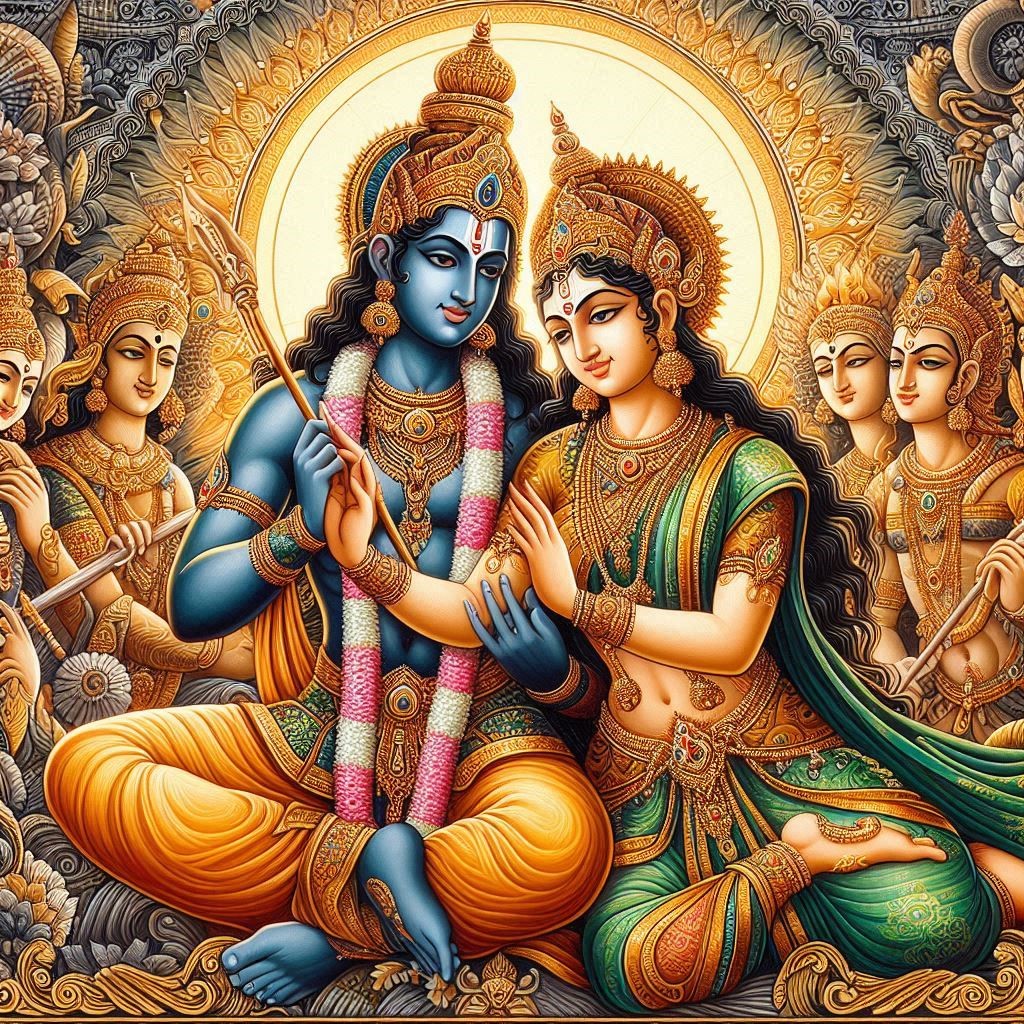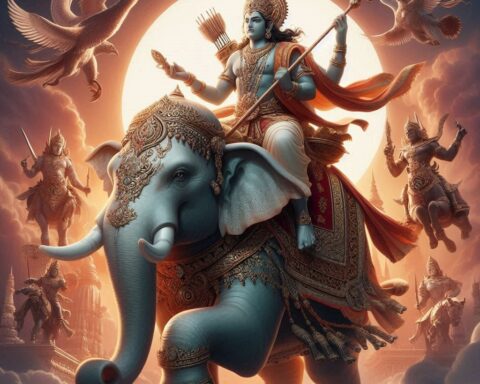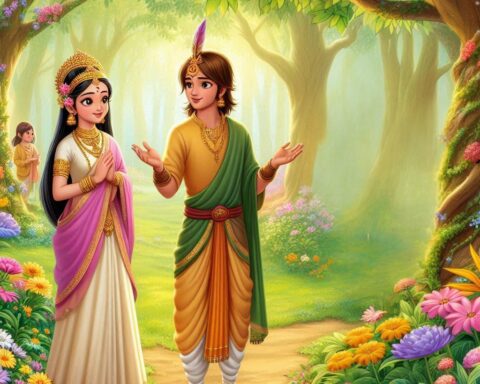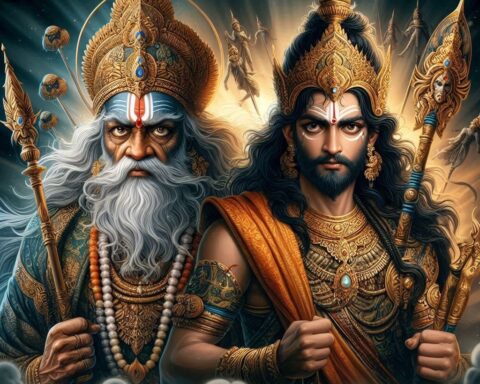Abhimanyu – Varchas
Krishna’s meeting with Chandra, the Moon God went off well. The interaction took place a few years before the Kurukshetra war, and Krishna, the beloved friend and mentor of the Pandavas, was preparing the ground for them.
Krishna needed the Moon God’s help to restore fast-eroding dharma on earth. Although Chandra was reluctant to give what Krishna had come for, as a Deva, he was obliged to participate in the annihilation of adharma. So, he agreed to Krishna’s request that Varchas, the son he loved more dearly than anything or anyone else, be born on earth to fulfil certain obligations in the Kurukshetra war.
However, Chandra had two conditions before he agreed to part with his son for a few years; one was that Varchas should be born as the son of Arjuna, the mighty Pandava; and two, he should return to his heavenly abode after 16 years on earth, not a day more.
“I cannot bear to be separated from my beloved son beyond that,” emphasised Chandra.
Krishna promised to abide by Chandra’s conditions. But, Chandra wanted to be doubly sure. So, he made his own arrangements for his son’s return after 16 years.
Abhimanyu’s Heartbroken Mother Survives
Subhadra’s survival instincts took over automatically when she heard the news of her son’s death. The shock of the news numbed her senses and cushioned the agony of her throbbing heart. The shock created a thick web around her heart so that she wouldn’t feel its aching emptiness. But she couldn’t help wondering how and why her heart continued to beat and keep her alive despite knowing her son was dead. What more purpose was she to serve? How much more pain should she endure?
She needed to get away from the suffocating grief that pervaded the atmosphere. But, she couldn’t run away anywhere as she was surrounded by mourners trying to console her and themselves. Abhimanyu was everyone’s darling. She closed her eyes and delved deep into her memories to recall that beautiful day when she sat talking for hours with her husband, Arjuna.
They spoke of so many things, especially of a bright, happy future centred around the child she was carrying. The baby was due any time soon. What an active and impatient child he seemed! He was kicking her ever so often as if telling her he wanted to get out into the world soon! That he can’t wait to see his mother’s beautiful face.
She had shared these thoughts with her husband. He laughed in delight and said, “Our son is definitely not going to be disappointed with the beauty of his mother’s face!” She had blushed in happiness.
Again, her baby had kicked trying to draw her attention back to himself. She had winced in pain. Arjuna looked concernedly at her. That’s when an idea struck him. He said, “Our son is going to be a great warrior. So why don’t I start his training now itself?”
“What do you intend to teach him?” She had asked.
Arjuna thought for a while and replied, “Let me tell you about one of the most complex military formations used in battle, the Chakravyuha. Maybe our baby would get tired and sleep off and give you a break from his kicking.”
They had laughed at the suggestion little knowing then that their son was highly intelligent and was able to hear, understand, and imbibe everything even while he was in his mother’s womb.
Arjuna started explaining how the Chakravyuha formation is constructed and the tricks to break and enter it. It was a long-drawn and detailed explanation. As Subhadra listened to the monotonous lecture, she was drawn by the bright moon in the dark sky.
Chandra was in full splendour and the aura of the moonlight lulled her into a deep sleep. By the time Arjuna completed the part of entering the Chakravyuha, and before he could continue the lesson on how to come out of the labyrinthine maze, Shubhadra had fallen asleep.
Hearing his wife’s gentle snores, Arjuna stopped talking, smiled down at her beautiful face, and tucked her in comfortably, completely unaware that he was unwittingly sealing his son’s lifeline.
That’s how Abhimanyu could enter the Chakravyuha and break it but didn’t know the way out. And that is where the brave lad of sixteen was trapped and killed in a dastardly and cowardly manner. According to the Pandavas’ plan, they were to follow Abhimanyu into the Chakravyuha so that he would not be trapped alone in the enemy camp.
However, Jayadratha, the brother-in-law of the Kauravas (he was married to Princess Dushala, the only sister of the Kauravas) blocked all of them once Abhimanyu entered. Subhadra’s son was left to fend for himself alone against the tyranny of numerous enemy warriors who attacked him simultaneously, an act that was totally against the ethics of warfare.
Subhadra was jolted out of her reverie. She wept piteously, “I killed my son. I am my son’s murderer. I fell asleep when I should’ve stayed awake. I failed as a mother.” She was now inconsolable as she felt her heart break into a thousand pieces as she felt the stab of guilt enhance the agonising throbbing of her heart. The numbness of the shock lost its strength and she could feel the searing pain and the frightening hollowness of her empty womb.
Her brother, Krishna walked in at that moment. She rushed to him for comfort, “He is only 16, Krishna! How could you let this happen? Why him? Why me?” She wailed in inconsolable distress.
Her brother looked at her, his face filled with an inexplicable sadness. He held his beloved sister in a comforting hug and told her the reason why Abhimanyu had only 16 years of life on earth, perhaps hoping an objective view would help his dear sister.
He also explained to her how he and Arjuna were deliberately called away to Trigatas so that Dronacharya could defeat all the Pandavas with the highly intricate and powerful Chakravyuha formation. Abhimanyu was the only one who could break it, and he didn’t hesitate to get into the lion’s den knowing fully well that he was highly vulnerable because he didn’t know the way out. His purpose was to save the Pandavas, no matter what.
“My dear Subhadra, Abhimanyu was destined to go back to his heavenly father today,” said Krishna.
Krishna looked up at the sky and saw the Moon waiting in happy anticipation for the return of his son. Krishna realized the part played by the Moon God on that night of Arjuna’s lecture. He had ensured Subhadra was lulled into a deep sleep.
Subhadra turned to her brother, her eyes blazing with anger, “You and Chandra made sure everything was in place so that your so-called dharma prevails.”
“You negotiated with Chandra for his son to be born on earth. Chandra made sure he would get his son back as promised. You made sure he was brought up as a brave warrior under his father’s and your son, Pradyumna’s training. You made sure he learnt to fight so well that he could defeat even the mightiest of warriors in the Kaurava camp. You taught him how to overcome the fear of death. The only thing you didn’t teach him was how to get out of the maze. That is very convenient, Krishna. Are you on my side or the Moon God’s?” cried Subhadra, her eyes livid with tear-filled rage.
“And, none of you considered the heart of a mother that would never be the same again after she loses her child. Is there no place for a mother’s heart in your dharma? At least, why can’t I choose to go with my son?” Krishna looked at the anger-laced grief-stricken face of his little sister and had no comforting answer to that question.
He told her, “Remember my dear sister, all life forms on earth have a purpose and when that purpose is achieved, that life form disintegrates. You forget that Abhimanyu had another role to play as Arjuna’s son; to leave a part of him growing in the womb of his wife, Uttara. Your grandson will restore the Kuru clan to its original glory, and you need to live for him.”
But Subhadra was inconsolable and Krishna’s philosophic talks only deepened her pain. Kunti, her mother-in-law, heard this exchange and walked towards the siblings. She drew her daughter-in-law away from Krishna towards her and said angrily, “Save your talks on philosophy right now, Krishna. No one can imagine the pain of a mother’s heartbreak when she loses her child. Go away from here and engage in your warfare. Leave us alone to our grief!”
Kunti and Subhadra were united in grief. Regardless of whether a mother lost her child to death or chose to abandon him, the pain is equally searing and unbearably difficult to bear. The pain gets inextricably stuck in her soul.
The birth of Abhimanyu might be seen as a karmic outcome by Krishna; but a mother’s heart only sees it as a failure on her part to save her child, despite logic and reason telling her that what happened was beyond her control. But, Subhadra had to hold on to her life for a few years more because she needed to be there for her grandson, Parikshit, a part of Abhimanyu left behind for her consolation. Her job as a mother was not over yet.
Author’s Note:
The birth of Abhimanyu is a classic example of the irrelevance of longevity to achieve the four principles of life namely dharma, karma, kama, and moksha. He was able to do everything in just 16 years.
This blog post is part of the blog challenge ‘Blogaberry Dazzle’
hosted by Cindy D’Silva and Noor Anand Chawla
in collaboration with Zariya Healings.







Interesting to know these stories. I wasn’t aware of Subhadra and Chandra until I read this.
Thank you, Cindy, I’m so happy you like my blogs.
The last three lines of this post were gems. Life need not be long to be impactful.
Thank you, Preeti.
Sad, but true. The human form is just a means to fulfill the purpose. When the purpose is over, the body perishes.
Intresting story. I didn’t know about Abhimanyu birth story. Afterall life is for purpose only. I like the way you narrated it.
Yeah, the reason for Abhimanyu’s birth on earth is not as well known as the way he died! Glad I could introduce a new aspect of a popular character. Thank you for reading.
Ratna mam, I am revisiting the pages of Mahabharata with you and the way you are narrating the key episodes of this epic helped me in observing and analysing the chapters altogether in a different angle.
Thank you so much for your encouragement. I love our epics, and enjoy the process of retelling important and not so popular stories and character sketches. Am so glad you like them.
Thank you for sharing this story about Abhimanyu. I could relate to the loss, profoundly. A mother’s grief on losing her son cannot be justified in any way. I lost my young son and I don’t know why I am still alive. I never knew many characters in this story. Didn’t know Kauravas had a sister.
oh my, Harjeet! I don’t think I can ever claim to imagine your pain. Hugs to you, and don’t ever think why you are alive. I believe it is to keep alive your son’s legacy, no matter however small it may seem.
There are so many bits about these mythological episodes that you’re making me recollect through your posts. You’re not only promoting the roots of our culture but also helping me relive my childhood, which is when I started hearing or reading these tales
thank you so much for your kind words. That’s exactly what I want to do, to spread stories from our puranas and itihasas.
I did not know that Chandra wanted his son back soon. I always felt sorry for the little lad and along with him the other great warrior, Karna. Both of them in my opinion are characters that evoke respect and pity.
Apart from reproduction, I am yet to figure what my purpose in life is… n noooo, I don’t want to disintegrate before that… hahaha. Jokes apart. I love to read your stories Ratna. They’re simple yet engaging and although I already know the story, I am excited to know what happens next. keep them coming!
Thank you for your kind words and encouragement, Kaveri
Abhimanyu’s story always makes the mother in me agonise in deep pain. Nothing can be worse than being massacred by your family elders by breaking every rule of war they taught him. I always try to avoid this part. 🙁 However, this did prove the jolt that Arjun needed to aggressively attack the Kauravas.
I didn’t know about Chandra and Arjuna’s agreement regarding Abhimanyu. Thanks for sharing.
I agree with Cindy, if it weren’t for your post we wouldn’t be aware of such stories. You are educating us by bringing such stories to light in form of your blog post.
Thank you for your kind words, Caroline. That is the purpose of retelling these stories, to bring forth lesser known aspects.
I could never fathom the death of Abhimanyu: not when I first watched Mahabharat when I was tiny not now, when I have read and analysed the epic saga in depth. Everything aside, it’s just not acceptable for me.
True, no mother can accept what happened to Abhimanyu regardless of how seemingly predestined things may be. Thank you for your reading and commenting
This story is new to me. I didn’t know the story of Abhimanyu’s birth. Thank you for sharing it with us. I always learn something new when I visit your blog.
I like to combine parallels from other folklore and focusing on lesser known facts while retelling Indian puranas and itihasas. Thank you so much for liking them.
Completely engrossed while reading the story, Ratna. I’ve read and listened to this story many times but your words hit another level. I’m a fan of your writing now. The details are represented so perfectly that everything seems to be happening in front of me… especially the Subhadra part!
#lovedit
Aww, thank you Aditi for loving my stories. Its words like these that keep me motivated to retell stories from our puranas and itihasas in my own words.
I have read Abhimanyu’s story many times but wasn’t aware of the origin. Love your storytelling and how you keep us captivated. Looking forward to reading more such stories.
Thank you, Ritu!
Wow… your short stories bring us back to the Mahabharata with you. By sharing these short stories, you’re helping me revisit my childhood memories when I first read them and then read them to my kids. It’s like reliving our cultural roots together. Thanks for sharing with us.
Thank you for stopping by, and more so for sharing with your children, Anjali. Hope they enjoyed the stories too.
I really admire the way you retell the stories from mahabharata. It feels like totally new perspective of looming into the same matter. Great job..
Thank you, Shifali. I’m so happy you like my narrations of oft-repeated tales.